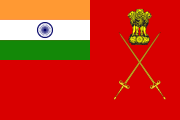- Afsir Karim
-
Indian Army Headquarters New Delhi History and traditions Indian military history
British Indian Army
Indian National Army
Army Day (15 January)Equipment Equipment of the Indian Army Components Regiments Personnel Chief of Army Staff
Ranks and insigniaMajor General Afsir Karim, is a retired Indian Army general and military scholar who has authored several books on strategic affairs & military studies. He is a graduate of the Defense Services Staff College, Wellington and the National Defence College.
Army career
General Karim was commissioned in the Indian Army in June 1954. He commanded a Para Battalion during the Indo-Pakistani War of 1971 in the Eastern Sector. In 1978, he assumed command of an infantry brigade in high altitude in the Northern Sector. In May 1984, he took over command of an infantry division of the Southern Command.
A specialist of issues related to terrorism, he has authored a number of books - Sri Lanka Crisis (co-author 1990); Counter-Terrorism: The Pakistan Factor (1991); Transnational Terrorism: Danger in the South (1995); Story of the Airborne Forces (1995) and Kashmir: The Troubled Frontiers (1994). He was a former editor of the premier Indian defense publication 'The Indian Defense Review' and a life trustee on the Forum for Strategic & Security Studies.
He is considered to be a pre-eminent expert in the complex topic of the disputed state of Jammu and Kashmir having served a good part of his career in that part of India. His views and opinions regarding the various aspects of the Kashmir dispute from a strategic, military and historical viewpoint are regularly sought by leading Indian and international publications.
Karim has written extensively on Kashmir and he authored Op-Topac, the semi-fictional account of Pakistan's game plan for Kashmir. In 1996 he wrote 'The J&K Problem: An Interpretative Study'. Occasional Paper 2. Forum For Strategic and Security Studies, New Delhi.
His work is particularly significant because of the nuclear weapons dimension introduced in the subcontinent with both India and Pakistan being proven nuclear powers. Kashmir is considered to be a potential flashpoint for a nuclear dispute between the two often belligerent neighbors by much of the western and international community.
He was a member of India's National Security Advisory Board (1999-2001), and was awarded the AVSM for distinguished service of an exceptional order by the Indian government for his military service.
He retired from the Indian Army on 31 May 1989.
References
- Akrosh - Asian Journal specialising in international counter-terrorism and conflict management
- Audio interview on recent Indo-Pak peace moves
- Lessons from the Indo-Pak war of 1965
- Interview detailing the various aspects of the J&K dispute
- Glimpse of the LTTE's Fortunes in Sri Lanka: Designs on India
- The Indian Armed Forces - a Basic Guide by Gen.Karim
- Article from Defense News seeking comments on the Indo-Pak ceasefire in the Siachen Glacier
- Article from the Indian Defence web-site Bharat Rakshak regarding the Kargil conflict with Pakistan
Categories:- Muslim generals
- Indian Muslims
- Indian generals
- Generals of the Indo-Pakistani War of 1971
- Indian military writers
- Living people
Wikimedia Foundation. 2010.

